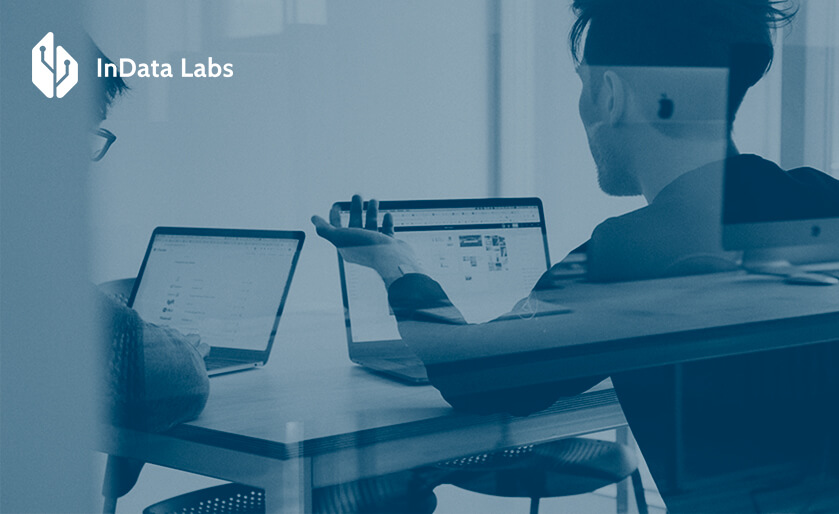Digitalization is getting a big word of mouth nowadays. In particular, the role of AI in digital transformation is getting extensive discussion as a central enabler of the tech-savvy business future.
Why – you ask? Digitalization requires the wide adoption of automated systems to reach business goals. These can include supreme consumer experiences, daily operations, and business decisions. And this is where AI digital transformation comes in. Let’s find out how this innovative technology makes a difference in modern business. We’ll dwell on the fundamentals of both. And we’ll also go over the main applications of AI and digital transformation.
Behind the beast: what is digital transformation?
Digital transformation is a revolutionary overhaul of the business model. It also refers to the use of technology that converts legacy processes into digital ones.
This approach doesn’t come down to introducing the latest hardware and software. It also initiates fundamental changes in approaches to management. Corporate culture and external communications are also important. Digitalization of business processes aims at facilitating quick decision-making. It also enables easier and faster shifts according to the evolving needs.

Source: Unsplash
The development of technology is beneficial for IT companies and other industries. Transportation, banking, retail, and agriculture are all flocking to the tech-first strategy. Even public services are all going digital to cut costs and increase efficiency. Thus, in 2022, spending on digitalization will grow to $1.8 trillion. By 2025, this number will double to $2.8 trillion.
What is AI digital transformation?

While this definition sounds complicated, most smart systems share the same concept. They get value from available data to promote any digital efforts. Hence, digital transformation through artificial intelligence allows businesses to capitalize on their data. It addresses weaknesses, predicts outcomes, and gives a competitive advantage in the market.
As you see, it all comes to the effective usage of data. Thus, Artificial Intelligence is the most potent protagonist of digitalization due to its analytical and processing capabilities.
Artificial intelligence in digital transformation: top impacts
Data literacy and intelligent systems open up a wealth of new opportunities for businesses. Insights allow companies to expand their reach and enhance current products and services. Thus, AI-driven digital transformation ushers in new business models and new revenue streams. Now let’s see where you can apply smart systems to reinforce digitalization.
Supreme customer experience
Around 84% of customers spend more money with great experiences. That is why brands should channel their digital efforts on ensuring greater experiences. And intelligent algorithms can help tap into the minds of consumers.

Moreover, AI revolutionizes marketing efforts. It introduces personalized experiences, eliminating outdated all-purpose marketing. Thus, with AI, marketers can target specific customer segments. AI algorithms can track large groups of customers and consumer characteristics. Then, they group them into detailed segments for targeting.
Predictive analytics
The power of forecasting is the driving force behind business intelligence. Hence, analytics competency is a salient benefit of adopting artificial intelligence into your transformation journey. Data analytics amplifies decision-making through processing past and real-time data. This translates into data-driven marketing campaigns, effective asset maintenance, and improved financial performance.
Moreover, this form of AI assists companies in the following pursuits:

Security
Smart security infrastructure is the next pillar of artificial intelligence digital transformation. As such, intelligent security involves leveraging AI to identify and avert cyber threats. With intelligent algorithms, businesses don’t need a large security staff. Artificial intelligence can automatically keep hackers at bay with less human intervention.
In 2019, around 75% of surveyed IT executives reported the use of AI for cybersecurity. The applications vary based on the business’s weak points. Thus, smart algorithms assist companies in network security and threat prevention. They also help avoid human errors and adopt biometric verifications.
Edge AI
Edge computing is heralded as the next frontier in digital and AI transformations. As such, edge AI is the combination of the latter and computer intelligence. This phenomenon refers to a distributed computing model where computing does not take place on a centralized server or in the cloud. Instead, it brings essential computation onto the device itself.
Why is this setup necessary for the tech revolution? By 2025, we’ll have 175 zettabytes of data. Sooner or later, the amount of generated data overwhelms cloud networks. This, in turn, will result in unacceptable response times. By bringing data processing to the edge, companies can drive real-time operations, connectivity, and scalability at affordable costs.

Source: Unsplash
Paired with AI, edge computing can process data in real-time, without having to connect to a cloud. Deep learning also facilitates operations on the device itself, the origin point of the data.
Business Operations
Business operations is a broad term that encompasses companies’ daily activities. The latter aims at increasing the value of the enterprise and yielding bigger profits. According to IBM, data-based decision-making tools will reach a $2 trillion market by 2025. And artificial intelligence is what fuels these solutions.
Whether it’s strategic hiring or employee retention, algorithms rely on sentiment analysis technologies, biometrics, and others to uncover and correct hidden insights.
For example, IBM Watson Candidate Assistant is a popular talent management solution. It helps match potential candidates with the specific jobs that they will thrive in. As a result, companies act on accurate data and avoid biases that can occur in the hiring process.
Finance and accounting
According to the EY 2020 Global Tax and Transformation Survey, tax teams spend up to 70% of their time on tasks that could be automated. In this context, optical character recognition has proved effective in automating data extraction.

Source: Unsplash
This technology distinguishes printed or handwritten text characters from scanned documents. Then, it converts the paper stimuli into code for further data processing. As a result, OCR document processing facilitates document recognition and eliminates human errors.
Chatbots and employee training gamification are also prominent examples of process automation in finance. They enable companies to reduce costs and scale up their services. Repetitive tasks are also handed over to machines.
Artificial intelligence digital transformation: picking your first AI project
Almost half of the companies are driving digital transformation using AI. The application area of machine intelligence is vast. From better security to hyper-automation, it underpins the digital efforts of businesses.
But companies shouldn’t rush into projects. First, they should align their key perspective with technology. Internal data and AI opportunity audit is also a vital prerequisite to the implementation of artificial intelligence. Consider choosing relevant KPIs, realistic goals, and performing team training. Moreover, there is much more on ethics and management of AI-enabled projects.
Combining digital transformation and AI seems like a monumental task for time-tested practices. But once you tap into these uncharted waters, your guesswork will transform into date-laden and calibrated efforts.
Make a shift to digital with AI
Looking for a way to move your business to digital or make it data-driven? Set up a call with our AI consultant to discuss your business and find a suitable solution for you.



